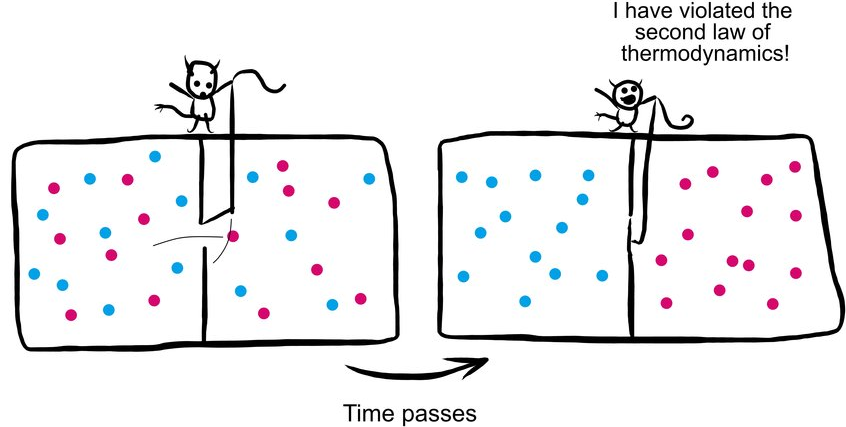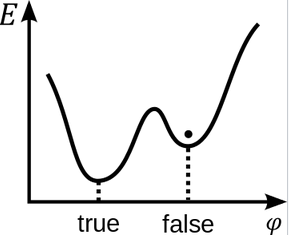Frame Challenge: the definitions provided may overly restrict the desired answer. Please allow me to propose some changes
Definition 1: "Technology" is a means to transform subject's intention to achieve external goal through, at first, creation of internal model (symbol, blueprint), then, after it by the use of an external tool.
I propose that the tool is not required.
Graph format: Volition -> Symbol (Model) -> Tool -> Profit.
Examples: A hostage negotiator uses his training to talk down a bank robbery; a banker uses best-practices to close a deal; a politician uses propaganda to mobilize population to raze the mountain-top.
Likewise, I propose that "technology" may use either internal or external models to accomplish the task.
Definition 2: "Magic" is a means to transform subject's intention to achieve external goal through creation and manipulation of internal model (symbol, blueprint), without the use of an external tool.
Graph format: Volition -> Symbol (Model) -> Profit.
I propose dropping this definition entirely, in favor of the following:
Graph format: Volition (...) -> Symbol (...) -> Profit (...)
The Familiarity Axis (Profit)
What we're trying to achieve (profit) can be mundane, or pretty weird. Because our profit target can be vague, getting profit that we are happy with at the end of the day depends on how weird is being shot for. Here are some bands along this axis:
The familiar are things like saddling my horse, or tightening a sail. I don't have to understand how they work (symbol/understanding), and I don't have to be the one to do them (volition/agency). Familiar profit goals are easy to assess, and the profit will be what you asked for (most of the time)
The unfamiliar are things like a skunk being able to emit an overpowering stench, or an eel being able to shock you, or ink from a squid, or poison from a viper. I can still work with the unfamiliar to achieve an outcome - I can harness squid ink; or viper venom; I can put skunks on my trail to deter hounds; I can use hound's incredible sense of smell to find lost people. However, the unfamiliar may not always, even when used properly, get me my profit.
The alien things are inexplicable. Like life at the bottom of the deepest ocean trench; or the processes beneath the earth. Again, understanding of alien things is not required to profit : I need not understand Raleigh scattering and microstructures to use opals; or mine diamonds to be used for their characteristics; I can use smallpox blankets to attack my enemies without understanding anything of germs; and I can use the golden extract of a certain kind of bread mold to help heal infections. However, the alien are least likely to get me to my profit. In fact, my familiarity with alien things is so dim that someone might trade my smallpox blankets for clean blankets, or my clean blankets for plague ones, entirely without me being able to tell the difference.
Graph: Volition (...) -> Symbol (...) -> Profit (familiar/unfamiliar/alien)
The Understanding Axis (Symbol)
How much do I understand (have the symbols or mental models) the actions I am taking to get the profit? Here are some ideas:
- At the level of technology, I have accurately-enough defined every variable; resolved every important paradox; and simplified the core relationships into something anyone can use at their writing table. I can make designs and evaluate them against theoretical minimums and maximums.
Technology can be unfamiliar - I can use some kind of stimulant to get an eel to shock, but I am much more likely to use my better understanding to switch to a familiar alternative like blasting lightning out of a generator.
Understanding can be less precise as Art. Some concepts are defined, but whether the things that have definitions are the simplest expressions is still undetermined. There are paradoxes that we have not identified the language to express and overcome, and these paradoxes keep us from precision modeling. Instead, we use expensive trial-and-error to "walk our fire" to profit, usually over many unprofitable iterations.
And at it's least precise, understanding is Magic. It might be possible to stand on a certain field during a storm and call lightning from the sky. A technologist would know the field your standing on has natural conductive and insulating layers turning the area into a natural battery, that is getting charged by the storm overhead. But a magician just can imitate the things he or she saw that caused the effect last time.
Graph: Volition (...) -> Symbol (technology/art/magic) -> Profit (familiar/unfamiliar/alien)
The Agency Axis (Volition)
Who is doing this, anyway?
This is a very important distinction. You might ask - “why?”. Using other agents gives you access, potentially, to broader perspectives or better information. You may not get the profit you had in mind when you engaged these others; you may get something BETTER . Something beyond your imagination. You may:
Appeal to your self. Obviously, you are the one seeking the profit. And limited by your understanding and the familiarity of what your intended outcome is.
But you may appeal to a group. A group may just be you and the monster under the bed working together; but you are at a minimum an essential co-partner in the action. Maybe the nukes just can't be launched with a single key. A group might be semi-divine such as spirits of your ancestors, or outright divine like elementals, nature spirits, or deities. The others in the group have the option to decline your request. You are sharing agency, and may be able to get by on only a little help.
Finally, you may appeal to someone else. You have given up agency; your volition is not driving the profit. You might make a request, but the someone else might have taken action regardless. Someone else might modify the plan slightly to include you, or may say "no". Someone else may even choose to work against your profit.
Graph: Volition (I/us/you) -> Symbol (technology/art/magic) -> Profit (familiar/unfamiliar/alien)
Some Final Graphs, and Examples
Graph: Volition(you) -> Symbol(magic) -> Profit(alien) : prayer for a miracle from a deity. The seas part; you walk on water; the aliens blast a mountain with their ray guns
Graph: Volition(you) -> Symbol(magic) -> Profit(unfamiliar) : taking a sick child to healing springs; or a medicine man; or a unicorn; a fairy, or a questing beast
Graph: Volition(you) -> Symbol(magic) -> Profit(familiar) : leaving an enemy out in the desert for the beasts and the sun to get him or her.
Graph: Volition(you) -> Symbol(art) -> Profit(alien) : a prayer uttered over a sketchy rope bridge made of rotting jungle wood and improvised vines
Graph: Volition(you) -> Symbol(art) -> Profit(unfamiliar) : a gambler playing the odds at a table; a military strategist estimating losses in an upcoming engagement; an adventurer stepping into the unknown with only the god(s) and their wits at their side
Graph: Volition(you) -> Symbol(art) -> Profit(familiar) : complaining to the local magistrate of problems in your town; politics within your peer group (maybe something dazzling like anti-matter physicists)
Graph: Volition(you) -> Symbol(technology) -> Profit(alien) : sending money or a note of approval to a crowd-sourced volunteer effort to cure hunger; or poverty; or a group tagging great white sharks on the other side of the world.
Graph: Volition(you) -> Symbol(technology) -> Profit(unfamiliar) : sending a note of encouragement to a group that is attempting to drill wells; or set up cell towers in the remote rural parts of this world.
Graph: Volition(you) -> Symbol(technology) -> Profit(familiar) : donating to your local second-hand-goods store or food bank, with an intended profit of getting those goods offered for resale.
Graph: Volition(us) -> Symbol(magic) -> Profit(alien) : allowing yourself to be possessed by a spirit, deity, or strange brain symbiotic so that you can obtain power to avenge the destruction of your homeland; you supposedly retain the power to throw off the possession, so your willing on-going participation is required.
...



